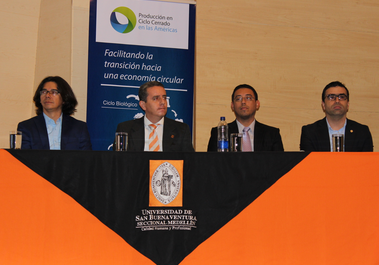
 A total of 370 people attended the workshops, titled “Closed Looped Cycle Production in the Americas: An Innovative Vision of Productivity.” The events were held in Bogotá on July 29 and Medellín on August 1. Experts from the OAS General Secretariat and Colombia’s National Center for Cleaner Production provided the training as part of an ECPA project called “Development of Sustainable Production towards a Circular Economy in Colombia.” Colombia’s Ministry of Industry, Trade, and Tourism and the University of San Buenaventura were also involved in organizing the event.
A total of 370 people attended the workshops, titled “Closed Looped Cycle Production in the Americas: An Innovative Vision of Productivity.” The events were held in Bogotá on July 29 and Medellín on August 1. Experts from the OAS General Secretariat and Colombia’s National Center for Cleaner Production provided the training as part of an ECPA project called “Development of Sustainable Production towards a Circular Economy in Colombia.” Colombia’s Ministry of Industry, Trade, and Tourism and the University of San Buenaventura were also involved in organizing the event.
One aim was to raise awareness in the business sector, including among small and medium-sized enterprises, about production practices that are more efficient and sustainable. Through an initiative funded by the Permanent Mission of the United States to the OAS, ECPA promotes production methods that improve environmental performance, productivity, and competitiveness by using renewable energy, maximizing energy efficiency, eliminating the use of toxic chemicals, and reducing waste.
Edith Urrego, a representative of the Ministry of Industry, stressed the importance of this OAS initiative for business development, because “the project can go beyond academia and the public sector and reach companies.” During the workshops, companies were invited to participate in a pilot program, with training and technical support from experts, to identify the potential for their companies to use closed-loop techniques for one of their products. The experts will also advise the companies on preparing proposals to apply for national or international funding.
This initiative builds on the political commitment to sustainable production made by the region’s Ministers and High Authorities on Sustainable Development at their 2010 meeting in the Dominican Republic. The Declaration of Santo Domingo states: “Unsustainable production and consumption patterns result in complex challenges to sustainable development and human well being; and also, the deterioration of the goods and services provided by ecosystems has an impact on economies and on the livelihoods of the communities that depend on them and affects their capacity for resilience.”
 View Map
View Map